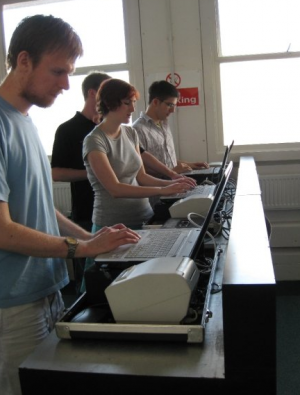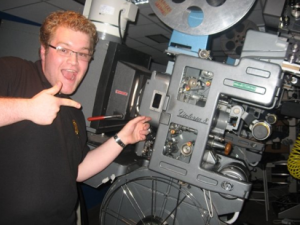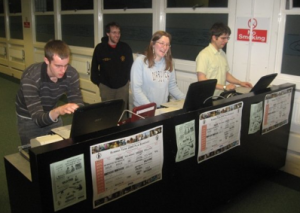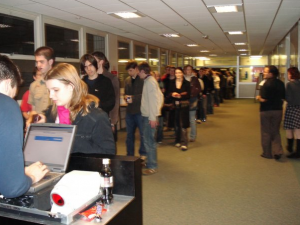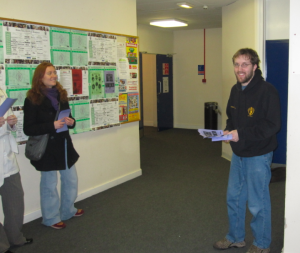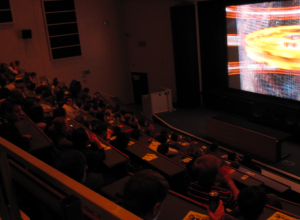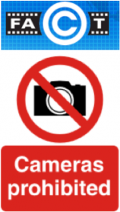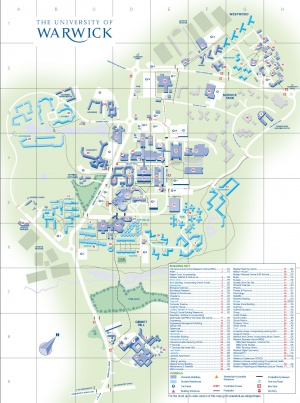Difference between revisions of "Duty Manager Training Guide"
(→Packing Away Tills & Late-Comers.) |
(→Cashing Up) |
||
| Line 158: | Line 158: | ||
Trainee DMs should only cash-up in the presence of their qualified DM. |
Trainee DMs should only cash-up in the presence of their qualified DM. |
||
| − | + | Make the floats up to £100 in a mixture of coins (50p and £1) and notes (£5 and £10), and fill in the banking details as per your DM's instructions. All the stuff you will need for this is in the DM cupboard. You'll get plenty of practice doing this and the exact method you use isn't important, so long as the end result is accurate! |
|
| − | Remember to fill in the appropriate online forms (see [[EPOS for DMs]]) as well as the paper ones, updating the printed show report if any late-comer tickets have been sold. |
+ | Remember to fill in the appropriate online forms (see [[EPOS for DMs]]), as well as the paper ones and the banking bag, updating the printed show report if any late-comer tickets have been sold. |
== After the film == |
== After the film == |
||
Revision as of 19:57, 10 November 2010
Contents
- 1 Introduction
- 2 Float Checking
- 3 Health and Safety
- 4 Stewards
- 5 Projectionist Communication
- 6 Other important things prior to ticket selling
- 7 Setting-up the Tills
- 8 During ticket selling
- 9 Letting the Audience into L3
- 10 Monitoring the Auditorium
- 11 Packing Away Tills & Late-Comers.
- 12 Cashing Up
- 13 After the film
- 14 Camera Policy
- 15 Technical Problems
- 16 Fire (or other emergency) Procedure
- 17 Medical Emergencies
- 18 Crew Standards
- 19 Qualification Show
Introduction
This page includes all of the information that trainee Duty Managers should learn during their training. This should complement details contained within the Trainee DM Booklet. Don't be scared by the length of this article - you'll learn almost all of this during your in-show training - this is here to act as a back up if you're uncertain on any detail!
The most important thing to remember though is that as a screening's Duty Manager, you are in charge. It is your show and all you have to do is use some common sense, keep safety in mind and have a presence. During both your training and post-qualification, there will be other qualified DMs around or accessible to help you.
This guide's structure roughly follows that of a screening, with:
- Points 2-7 relating to points prior to ticket-selling.
- Points 8-12 being during ticket-selling.
- Points 13 & 14 during the film.
- Points 15-19 are various possible issues, but hopefully these won't crop up often in your shows!
Float Checking
We usually ask that trainee DMs turn up to screenings 40 minutes in advance of the scheduled start time - this allows for extra preparation prior to the Stewards turning up.
Before your Stewards arrive, you should have time to check the floats. They are kept in the DM cupboard in the Exec Office. The key is on the labelled tag in the key box in the corridor, the qualified DM will have a key to this box. You should keep the DM cupboard key with you during the film as you'll probably need it a number of times. Make sure that the DM cupboard is locked when you're not using it as there is a large amount of cash and possibly other valuable items in there.
Check that each of the two floats contain £100 and that there is a good mix of notes and coins; if not, then use the spare change box which is also in the DM cupboard. If one of the floats does not total £100, take a note of this - it will be useful when you're cashing up!
Remember: as the DM, you are responsible for the floats at the show - do not leave them without DM supervision and lock them in the DM locker when not in use.
Health and Safety
Prior to permitting entrance to any patrons, check that the fire exits at the bottom and balcony level of L3 are clear, make sure that there is nothing blocking either side (inside or out) of the doors.
All rows and stairwells should be clear of any obstructions, taking particular note to remember to check in front of the projection box fire escape.
Stewards
Stewards are very important to the society; you wouldn't believe how difficult it is to run a show on your own! Generally the Stewards won't arrive together - some of the extremely keen ones may even be there before you are - so keep an eye out whilst you're setting up. Make sure you introduce yourself to them when they arrive and make sure they know to ask you if they have any problems at any point during the show. When they first arrive, the most useful thing to get them to do is to help clear up any litter in L3.
You should have up to five Stewards signed up for the film (you can check who they are on the rota). If you don't, then it's a good idea to recruit any Crew who have come to watch the film in order to have sufficient manpower (two or three Stewards will be sufficient for a quiet screening!); most of them will be happy to help out.
You will need to check your Stewards' levels of experience; if they've done fewer than three shows then they have a smiley face next to their name on the rota and you'll probably need to spend a bit more time with them. Check how many films they've done before and that they've all had a go at selling tickets and being on the door; if not then try to give them a job they haven't done.
If they're completely new then obviously you will need to explain everything in relation to the role they end up doing on the night - if you can get an 'Off-duty' DM to supervise them on the tills, then this provides a good opportunity for them to learn our system.
Other important things to remind your Stewards include:
- The fire evacuation procedure (see section below)
- What to do if we have a wheelchair user (link to later section)
- That we don't allow hot food, hot drinks, alcohol or popcorn in L3.
Any Stewards wishing to leave early should have emailed you 24 hours in advance, then they are free to leave when we finish ticket selling (after taking their till inside if appropriate). If they haven't emailed in advance, please ask them to do so on future occasions.
Projectionist Communication
If there isn't a Projectionist present approximately half an hour prior to the advertised start time and you don't know who it is supposed to be then check on the rota. Their contact details should be online and you can give them a call to see what's going on. If you can't get hold of them then first see whether there are any other Projectionists around for the show. If there are then it's worth asking them whether they're willing and able to cover the show.
If this isn't possible then call the Chief Projectionist (number also on the website) and try to arrange cover, either by you ringing some Projectionists or by the Chief Proj doing so and then ringing you back by a set time to let you know what's going on. Use your common sense at this point.
You need to talk to the Projectionist regularly throughout the preparation for the show:
- As soon as you see the projectionist, you'll want to check that the film is ok and that there are no major technical problems that would prevent the screening from starting on time.
- Another important thing to check is the length of the Ads and Trailers reel; it should normally be about 20 minutes long but can vary. Knowing what the first and last trailers are can help to ensure that you can be inside when the film starts.
- It is useful to find out whether the film is subtitled, or has strobing, as well as knowing the runtime and certificate, so that you can answer such questions if asked.
- Bear in mind that there is almost always a trainee Projectionist and you should talk to them instead of the qualified projectionist unless informed otherwise by the qualified projectionist.
You must check that the projectionist is happy for the screening to go ahead (this will usually be yes, unless there are any significant technical problems or issues with the film).
Other important things prior to ticket selling
If there are any Crew members around, check if any of them want to stay to watch the film, if they do then you can either print them out a ticket when you first set up or ask them to come and get one in a bit (the first option is nicer and probably easier).
Check that your Stewards have picked up all the litter from within the lecture theatre.
Also have a check to see how many broken seats there are as we obviously can't sell tickets for the broken ones. If there are more than ten broken ones then it's probably worth reducing the number of tickets you sell for the show. Also make sure that there are enough seats on the balcony for you and your Stewards, if not then the 'B' rooms on the Science Concourse are a good source, just remember to put them back after the show.
Place the 'Row Reserved' signs at each end of the middle section of the back row of the theatre (these will be in the Chief DM's tray in the Exec Office) - this reduces the chance of people obstucting the line of projection.
Take the two door stops from the Chief DMs tray - one can be used immediately to prop open the 'inside' door to the balcony and the other will be used on the outside door once the audience is permitted to enter.
Check the certificate and duration of the film on our website, IMDb or the BBFC. If it is a U-rated, PG or 12A film then some attendees may bring children. If any children do attend, you will need to check with the parent / guardian whether they are happy for the child to watch the adverts & trailers, which will not all be suitably rated. Your projectionist can find you these ratings if you need them.
Setting-up the Tills
When you leave WSC's rooms to go outside, and any time you come back in, make sure that the corridor door into L3 is closed, this not only looks neater but stops people wandering in. Turn off the lights that you can behind doors - eg. corridor light and those at the fire escapes at the bottom of L3.
Take the three (or two for a show which you expect to be quiet) flight cases along with the two float boxes out with you. Get the Stewards to carry the flight cases outside, but make sure they only do so if they feel comfortable (the cases can be quite heavy for some people). As Duty Manager, you are responsible for the money, so should only let a Steward carry the floats if wholly necessary. Whilst setting up the trolleys and tills, it is best to place the floats under the trolleys - to keep them out of view.
Once outside, set up the laptops and ask the Stewards to log in to the filmsoc page so that they can sell tickets. At very busy screenings, we generally only sell Memberships from the till nearest the window as this helps to cut down on the queue, make sure that the Stewards are aware of this (you'll have to announce it to the people in the queue in a bit). If you have enough Stewards then it's generally worth paring them up so one can use the laptop whilst the other deals with the money. It can also be a good idea to sort out who you're going to get to do the door and if you expect the show to be reasonably busy then ask them to go and stand by the door to stop people going in.
Before commencing ticket sales, it is advisable to put up the signs on the right hand corridor doors - these are usually located in one of the black trolleys on which we place the tills. The signs saying 'Please wait here until the doors are open' and 'No hot food, hot drink, popcorn or alcohol' should be attached (via Blu-tack) to the outside doors. The sign prohibiting the use of any recording equipment is placed on the unopened inside door, facing towards the outside door.
Most Stewards will either have done a show before, but if not, then you will need to go through ticket-selling and membership sales with them, or get a DM who isn't already working the show to train them. Remind them that if they have any problems then they should ask you (or another DM, or a more experienced Steward if it's a question about how to use the system).
To enable the Stewards to sell tickets, you will need to activate it in the EPOS system. Full details of this can be found in EPOS for DMs.
During ticket selling
Once set-up, the floats are placed in between the tills, ensuring never to have a float at the 'open' end of the line.
Whilst the Stewards are selling tickets, remember to keep an eye on the floats. Make sure that any excess notes and £20 notes are put under the trays, keep the box lids on the queue side, and ensure the floats are closed when not in use. If you get desperate for change then there is a spare change box in the DM cupboard which you can use. Just remember to put in the same amount as you take out.
We do not accept £50 notes due to the frequency of fakes and the problems it causes with change.
If it is a busy show or a queue develops for another reason then you may have to make announcements to the people in the queue. Make sure you sound confident and everything should run smoothly. Ask them to:
- Make sure that they have their University cards ready
- To queue by the windows for membership
- To have exact change ready where possible, etc.
If it appears that we are likely to sell-out (the number of tickets sold/remaining are displayed on the EPOS system), then the foloowing steps will need to be taken as quickly as possible:
- You will want a reasonably accurate estimate of the number of patrons in the queue to determine whether we are going to sell-out, and if so, by how much.
- If there are only a handful of extra patrons, then (provided there are sufficient seats remaining in L3), you can raise the number of tickets to accommodate them. Any further patrons will need to be turned away.
- If at least 30 patrons are unable to purchase a ticket for the screening, then you will need to contact a member of the Exec. The Exec will decide/determine whether or not we will hold an additional screening. Once the screening is sold-out, these patrons can be informed of the additional screening, where appropriate.
- Never turn patrons away prior to the last tickets being sold, unless you are certain that they will not make it in.
In the event of a sell-out, it is likely that you will need to ask the projectionist to delay the start of the film (after the trailers). However, this delay should be kept as short as possible.
Letting the Audience into L3
Generally, the earlier you open the doors the better as it helps to reduce any queueing outside L3. The time at which you let people in to L3 will be determined by whether the Projectionist is ready - we should be aiming to open the doors at least 10 minutes prior to the advertised start time of the film.
Always check with the Projectionist before you open the door to make sure that everything is technically ready. The conditions inside should include:
- Slides on screen
- Music playing
- The lights should be at a suitable level (ie you can see but it's dark enough to see the screen clearly).
However, these details are for the projectionist to confirm, not the DM.
Once it is confirmed that you can let the audience in, prop open the outside door and talk to the Steward(s) on the door. If they are new, explain to them that they need to check that the ticket is for the relevant screening and then tear the ticket. Also provide them with publicity (if available) to distribute whilst checking the tickets.
Unless you are sure that the Steward already knows this, remind them not to let anyone into L3 without a ticket (unless they are the show's DM or projectionist), or if they have hot food, hot drink, alcohol or popcorn, and again, if they have any problems, to ask you.
Monitoring the Auditorium
Once people have started going into L3, it is important that you keep going inside to check that everything is OK. Also take a moment to check that the Steward on the door is okay and there are no problems. If there is a large queue by the door it may be worth getting someone to help check tickets.
Inside L3, check that nothing is in the aisles (such as bags/coats) - taking special care to ensure the proj fire escape route is clear - and especially that nobody is sitting in the aisles. Keep an eye out for hot food or alcohol and make sure that the door to the corridor upstairs is kept closed.
If you have any wheelchair users come to the show, when the doors are open take them onto the balcony. They can have one or two helpers sat on the balcony with them (but use discretion; a couple of friends is usually no problem at all). Their carer is entitled to a free ticket, which can be sold by DM override. Make sure they have enough chairs and that you still have enough to seat all the Stewards and yourself. Talk to one of the Stewards and assign them to the disabled person so that in an emergency they are looked after, but be subtle about it.
If the show is busy, then towards the end of letting people into L3 you may need to move people into the middle of rows to free up some empty seats. Get some of the Crew to help if you need to, try to pick people who are loud and stubborn as they get it done a lot quicker (DMs are usually a safe bet). You may also need to direct people to seats. If people are still coming in during the ads and trailers make sure that it is light enough for people to safely find their seats, if not ask the Projectionist to turn the lights up a bit and not to start the film until you're happy that all audience members are suitably seated.
Packing Away Tills & Late-Comers.
The general policy is that you should have packed up and be inside by the start of the film. In order to achieve this, it is normally best to start packing up no later than 15 minutes after the scheduled start time of the film. Knowing the number of trailers and their order is usually beneficial as you can keep abreast of the ads & trailers reel with the webcam available in the ticket selling mode of EPOS.
People who arrive after the tills are closed down should be offered a Late-Comer ticket (£4), encouraged to attend the late screening (if this is the early), or simply turned away.
If a patron agrees to a Late-Comer ticket, take £4 from them and usher them into L3. They will not receive a paper ticket, but you must remember to sell one (to Percival Tucker!) on the system before cashing up, as per the details in EPOS for DMs.
Cashing Up
After you have qualified you can choose whether to watch the film and cash up afterwards or if you want to cash up during the film. However, remember that if there is a late show then you're going to need to have cashed up in time for the DM doing the next show to get the change boxes. If you choose the latter option, stay downstairs for at least 10 mins, so you can turn away any / sell late-comer tickets to any late arrivals and generally check everything is OK before you go upstairs. Always remember to tell your Stewards that you're going upstairs and that if they have a problem they should come and get you.
Trainee DMs should only cash-up in the presence of their qualified DM.
Make the floats up to £100 in a mixture of coins (50p and £1) and notes (£5 and £10), and fill in the banking details as per your DM's instructions. All the stuff you will need for this is in the DM cupboard. You'll get plenty of practice doing this and the exact method you use isn't important, so long as the end result is accurate!
Remember to fill in the appropriate online forms (see EPOS for DMs), as well as the paper ones and the banking bag, updating the printed show report if any late-comer tickets have been sold.
After the film
Clearing up
After the film finishes make sure the Stewards have opened the doors and are doing a litter check. Make sure you thank them for their help. We normally go to the bar after a show so encourage them to stick around for a few minutes and then come and have a drink with us - this is one of the advantages of cashing up during the film.
Banking the takings
A key for the night-safe is kept in the key-box in the corridor. Please bring it back the next day or give to a DM (or other responsible person) who will be at the next show. If you are doing an early show, then you may politely ask the DM for the late show if they would be happy to deposit your screening's taking with theirs later on.
Locking the doors
The fire doors at the bottom of L3 need to be locked after all the audience has left. This is to stop people coming into L3 in the night. You should also lock the two sets of doors at the balcony level upon leaving.
Camera Policy
It is always illegal for photographs or video to be taken of Trailers of a Film. Customers who break this law must leave the auditorium and will not receive a refund.
We will generally allow photographs to be taken when our slides are on screen, although warning the customer when caught. One of the signs on entrance to the theatre should read:
“You are not allowed to use any camera or recording device in this theatre.”
On special occasions we will use an alternative sign, reading:
“You are not allowed to use any camera or recording device in this theatre during the adverts, trailers or feature.”
In the event of a customer being asked to leave for breaking this law and them refusing, the situation must be escalated. First, try surrounding the individual with crew in WSC clothing; if this fails the film must be stopped and the individual embarrassed. If they finally refuse to leave Security must be called.
In any case, you should also witness the deletion of any photos / videos of copyrighted material.
Technical Problems
There are occasionally technical problems which will affect the screening of a film. These can happen before or during the showing of the film.
If the Projectionist tells you that there is a problem with the film when you see them at the start then don't panic. Ask the Projectionist how serious it is (e.g. "it's not going to affect much, it just means we may start a few minutes late" or "we really don't know when or if we're going to get this fixed"). In the more serious cases then it's probably worth not selling (or stopping selling) tickets as this reduces the number of refunds we have to deal with.
If you notice / are informed of something obviously wrong during the film (e.g. no sound or the image jumping up and down) then it's worth going up to the Projection Box to make sure that the Projectionist has noticed it. They almost certainly will have and will be busy fixing it so just stand by the Projection Box door in case they need to tell you something. If it's not fixed within a minute or so, ask them if they know how long it will be and how serious it is so you can make an announcement if necessary.
Fire (or other emergency) Procedure
Should a fire start anywhere you notice (whether in L3, the Projection Box, the Office, Concourse or elsewhere), hit the Fire Alarm and evacuate the building.
If the Fire Alarm goes off and you are inside L3, announce that people should leave by the nearest exit but evacuate yourself – do not wait for the audience, you are not qualified to evacuate them.
The Projectionist will shut down the equipment safely and lock the Projection Box themselves, or will hit the Emergency Stops if the fire is in the Projection Box.
If you are selling tickets when the Fire Alarm sounds, please retrieve the floats if safe to do so.
Unless a fire is obvious, we will usually assemble in front of the Open Access Work Areas and LIB2; at the bottom of the steps from the concourse.
Otherwise, the official assembly point is Car Park 8/8a. These are located next to the Sports Centre.
Disabled Customers
We regularly receive disabled customers to screenings, sometimes accompanied by Carers. When this happens, assign a Steward to watch over the customer in the event of a Fire Alarm. They should help where possible but it should not delay them leaving the building. You can then tell a Fire Marshall that there is a disabled customer in the building if you / your Steward did not see them get out safely.
Medical Emergencies
First Aid kits are located in the Exec Office and Projection Box.
All Duty Managers are permitted to dispense plasters and antiseptic wipes from the Exec Office kit.
(We do not have Eye Wash or an AED [Automated External Defibrillator]).
Important: Only Qualified First Aiders are permitted to perform treatment on casualties. Unless you hold a current First Aid certificate which has been approved by the Society’s Safety Officer, you should not perform any treatments and should seek more qualified assistance. In such a case, you should get Edward McCutcheon or Mike Joy if on site or phone Security.
If you do hold an approved First Aid certificate, you may only perform treatments to the extent to which you are qualified. Currently the Society actively recognises; RLSS Life Support, RLSS Life Support 3, RLSS Pool Lifeguard, HSE Approved First Aid at Work 3 day, HSE Approved Emergency First Aid at Work 1 day.
Minor Medical Incidents
In the case where a customer injures themselves and they can treat themselves with equipment from the First Aid Kit, let them do so and decide what to do about the hazard which caused the injury. This may involve blocking off the area, for example. This should then be reported to Maintenance, the Chief Duty Manager and the Safety Officer as a matter of urgency.
Major Medical Incidents
We are required to contact Security for all Major incidents, and therefore to stop the film / trailers and raise the lights. When sending a non-DM to tell the Projectionist to stop the film, ensure they communicate that it is a Medical Emergency and preferably to return with a First Aid kit.
Treat the casualty if you are qualified (see box above) or get further help. Nobody below a Nurse or Paramedic is qualified to administer drugs to others (which include Asthma pumps and Epi-Pens).
Electrocutions, Heart Attacks and Breathing difficulties (which could be caused by Asthma / Choking / Allergic Reactions, among others) will become very serious very quickly and normally lead to CPR. In these situations Security must be called immediately and notified of the diagnosis as an AED (Automatic External Defibrillator) will be needed. Some FoH crew have received certified supplementary training from Edward to deal with these incidents and can be used as well as Edward and Mike.
Electrocutions in the Projection Box: The Projection Box contains 6 Emergency Stops which will terminate the power immediately.
Security can be contacted by dialling either 22222 or 999 from an internal phone, or 024 765 22222 from a mobile.
After an incident it is necessary to report it to the Executive Committee (normally through the Chief DM) and hence the Safety Officer immediately.
Crew Standards
- The Duty Manager, Projectionist and their trainees on a show are required to be sober. The former is due to the need to remove alcohol from the audience, the latter due to the dangerous equipment in use. Do not be afraid to send your trainee home if you have an issue, or to speak to the Projectionist if you are unsure of their, or their trainee’s sobriety.
- The Exec have passed a motion that no alcohol is to be consumed by any member of the society in L3 / the rooms behind it during any WSC screening. DMs have the power and right to evict any Crew member refusing to respect this rule.
- The Duty Manager is required to wear WSC Clothing (note a Qualified DM with an experienced Trainee does not have to) whilst on duty, in order to identify them. Trainees are given a free WSC Polo Shirt to wear and, upon qualifying, receive a polo with their name and ‘Duty Manager’ embroidered for free. Any WSC official polo/hoodie/fleece in black is suitable for a DM – including those with nicknames, different roles or job titles, but not pieces with film quotes on them.
- DMs should not be scruffy, wear non-WSC clothing over their WSC kit, and should represent the professionalism the society aims for.
- Other on-duty crew are not required to wear WSC clothing although preferable. Clothing in the bottom of the DM cupboard is for new trainees or emergency supplies for when a DM forgets his own and is not for general distribution.
- Late or non-attending Crew should be removed from the rotas and a comment left on their profile. Exemplary performance should be reported at committee meetings and praise given to crew on the night – compliments are free! Remember, we're always looking for future DMs, so if you spot a Steward with good people skills, confidence and who generally seems to be a nice person, speak to them about DMing. If they're interested then contact the Chief DM!
Qualification Show
This is a test show to see if you're ready to qualify as a WSC Duty Manager. More information on what might be involved is available at the DM Qualification page.
